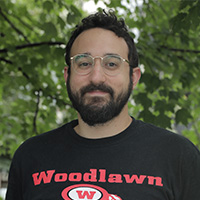
As a public high school world history teacher, my experience teaching students about religion often centers on basic outlines of five religions and belief systems: Christianity, Judaism, Islam, Hinduism, and Buddhism. Confucianism works its way in there once or twice as well. These belief systems are often situated early on in the class curriculum and then, I am embarrassed to say, only come up sparingly through the rest of the school year. I had never thought of a better way to engage the students in religious dialogue until this year.
Over the past nine months, I have had the opportunity to join the ICJS Teachers Fellowship. Early on in our Fellowship meetings, we discussed the importance of developing increased religious literacy in order to move away from just this type of overly simplified and comparison-focused model common in world history classes such as mine.
The goal is to push beyond these basic practices when teaching about religion and to more fully incorporate discussions of religion into the curriculum. It immediately made sense to me, especially when I realized how my prior teaching strategies had made religions appear as phenomena that are almost completely separate from other historical developments instead of belief systems that have played a central role in all civilizations throughout history.
Implementing new, more dynamic procedures in this field should benefit me as a teacher, as well as my students. It will provide students with a fuller understanding of historical developments and ensure that I am doing everything possible to create a welcoming environment for all where discussion is respectful and enlightening.
Having said all this, however, I was admittedly skeptical of effectively pulling this off in practice. While it is too early to reflect on any successes or failures of my own efforts in this much revised school year, working with my ICJS Teacher Fellowship colleagues and collaborating with ICJS leaders this year have inspired me to push myself outside of my comfort zone and to make this change happen in my classroom for my students going forward.
During our monthly meetings, I have studied religions more closely than I had previously. Learning about Islam from Zeynab Sayilgan, Judaism from Benjamin Sax, Protestantism from Matthew Taylor, and Catholicism from Heather Miller Rubens deepened my understanding of each of these belief systems. Specifically, it aided in placing each of these belief systems and their histories into a broader historical context, and helped me to see how they intersect with each other.. This increased knowledge will allow me to engage more fully with these world-shaping religions throughout the school year. One of the highlights of the program has been witnessing these scholars dialogue with each other as moderated by ICJS Program Director for Teachers Christine Gallagher on a variety of faith-related issues, both historic and contemporary.
Another instructive and enjoyable aspect of this opportunity has been getting to network with a dynamic crew of colleagues. These educators brought their unique experiences to each of our meetings, and I have learned much from them. I am better at my job due to their insights and expertise. Their presentations on various topics have challenged me in engaging ways. I am regularly impressed by my colleagues who are already engaging in interreligious dialogue as part of their routine. Through our meetings and activities, I have also learned techniques that will help push my pedagogical skills and conversations about difficult content forward.
Armed with this increased knowledge, new community, and techniques and strategies, incorporating religious literacy into my high school world history class no longer feels overwhelming; it feels exciting and I am ready to get started.
 Ethan Horn is a World History and AP World History Teacher at Woodlawn High School. Horn was a member of the 2020-21 ICJS Teachers Fellowship.
Ethan Horn is a World History and AP World History Teacher at Woodlawn High School. Horn was a member of the 2020-21 ICJS Teachers Fellowship.
Opinions expressed in blog posts by the ICJS Teacher Fellows are solely the author’s. ICJS welcomes a diversity of opinions and perspectives.